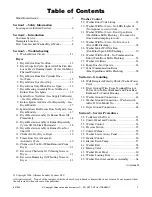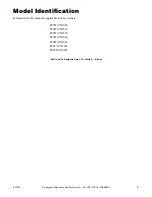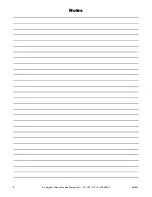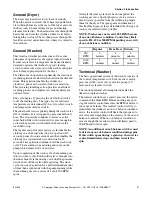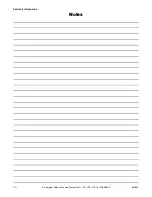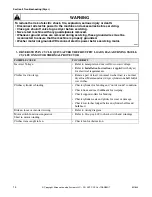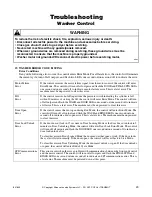
801805
9
Section 2 Introduction
© Copyright, Alliance Laundry Systems LLC – DO NOT COPY or TRANSMIT
General (Dryer)
The dryer uses heated air to dry loads of laundry.
When the motor is started, the exhaust fan pulls fresh
air in through louvers at the rear of the dryer and over
the heat source (burner flame for gas and heating
element for electric). The heated air moves through the
heater duct and into the cylinder, where it circulates
through the wet load. The air then passes through the
lint filter, air duct and exhaust fan, where it is vented to
the outdoors.
General (Washer)
This frontload washer provides some of the same
principles of operation as the typical topload washers.
It senses water level, it dispenses the desired laundry
detergent, agitates the clothes for good cleaning
action, removes the water out of the washer and spins
the clothing in preparation for the dryer.
The difference in operation is primarily the rotational
washing agitation created for the horizontal basket and
drum. This agitation tumbles the clothes in a
clockwise, pause, and counter-clockwise direction.
This reversing tumbling action provides an efficient
washing process and requires less laundry detergent
and less water.
The cycle begins by pressing the start button, which
locks the loading door. The type of cycle and water
temperature are determined by the cycle select switch
and temperature selector switch.
The inner basket starts agitating during the wash water
fill. A column of air is trapped in a pressure bulb and
hose. The air pressure continues to increase as the
inner basket fills with water until it is great enough to
activate the pressure switch which then causes the
wash fill to stop.
The regular and perm press agitate cycles tumble the
clothing in a clockwise direction for a period of 15
seconds, pauses for nine seconds and then tumbles the
clothing in a counterclockwise direction for 15
seconds. This agitation continues until the wash soak
cycle. The machine stops agitating and turns on the
pump which removes the wash water.
Upon completion of the wash cycle, the machine goes
into two rinse cycles. Fresh cold water is brought into
the inner basket via the mixing valve until the pressure
switch shuts off the water while agitating. The rinse
cycle consists of agitation for a predetermined amount
of time then a spin mode with the pump running while
the machine goes into a series of 4 short 500 RPM
spins.
After all the rinse cycles have been completed, the
washer goes into a final high spin cycle to extract as
much water as possible from the clothing to prepare
them for the dryer. The spin speeds and duration of
this final high spin cycle are determined by the type of
wash cycle selected (refer to table).
NOTE: Washer may not reach 1000 RPM because
of an out-of-balance condition. Control may limit
speed to 850, 650 or 500 RPM depending on severity
of out-of-balance condition.
Technical (Washer)
The basic operational system of this washer consists of
the control, temperature switch, the inverter control,
pressure switch, water valves, electric pump, A.C.
motor and cycle select switch.
The control performs all timing functions like the
timer in a topload washer.
The inverter control uses a speed sensor on the motor
to measure the drum RPM. Before entering any spin
step the inverter control measures the RPM of motor to
sense out-of-balance. The inverter control will try to
redistribute the clothes if an out-of-balance condition
exists; the inverter control will limit the spin speed to
several speeds depending on the severity of the out-of-
balance condition. If the out-of-balance condition is
severe enough the inverter control will limit speed to
90 RPM and will not spin.
NOTE: An additional out-of-balance switch is used
to detect any out-of-balance condition during spins.
If this switch opens during a spin step, the inverter
control immediately stops and then restarts the
spin.
Regular
Perm Press Delicate
650
RPM
3
minutes
4
minutes
4
minutes
1000
RPM
3
minutes
2
minute
0
minutes



